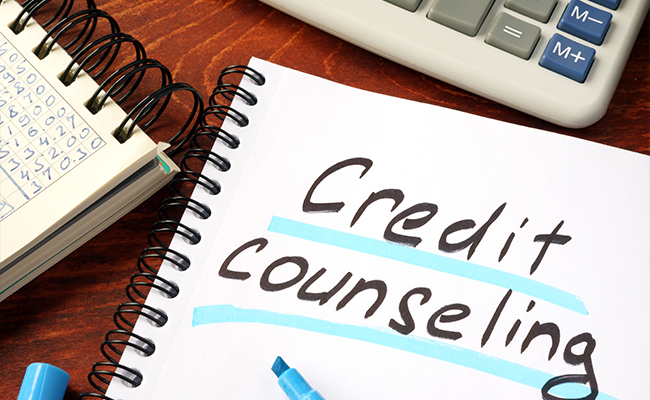What Is Credit Counseling? Here’s A Comprehensive Guide
Are you struggling with debts and financial stress? If so, knowing what credit counseling is could be the solution you’ve been seeking.
Credit counseling is a valuable service nonprofit organizations provide to help individuals regain control over their finances. From analyzing your financial situation to developing personalized debt management plans, credit counselors offer expert guidance every step of the way.
This article will explore the types of debtors that need credit counseling. Additionally, it mentions the benefits of credit counseling and the signs if you need one. Let’s embark on this journey to discover how credit counseling can help your financial future.
Ready For a Quick Quiz?
Take this 30-second quiz to check your eligibility for a Credit Card Payment Reduction.
What is Credit Counseling?

With a debt management program, DMP, A certified credit counselor can help you pay off your debts quicker. Depending on your case, the credit counseling agency could also help you negotiate a smaller interest rate and an extension in payment duration.

Read More: How to Pay Off Debt: 10 Ways to Kill Debt with a Low Income
3 Types of Debtors That Need Credit Counseling
These three individuals are advised to go for credit counseling:
Chapter 13 Gang
Though it’s not advisable to file for bankruptcy, sometimes people don’t mind the odds. Debtors who want to file for Chapter 13 bankruptcy must seek credit counseling before heading to court.
Debtors Whose Monthly Income Can’t Pay Their Debts
If you find yourself in a situation where your monthly wage isn’t enough to make the minimum payment on your credit card balance or your debts are no longer bearable, my dear, it’s high time you met a professional credit counselor.
Individual Debtors That Can’t Successfully Negotiate With Their Lender
Before contacting a credit counseling agency, consider negotiating a reduction in interest rates or extending the payment period with your lender. Peradventure, you couldn’t reach a fair conclusion; see a credit counselor.

Read More: How Do I Avoid Bankruptcy?
Signs You Need Credit Counseling
Below are the signs you need credit counseling as soon as possible. Could you check to see if you meet these conditions?
1. Do You Live From Paycheck to Paycheck?
Depending on a paycheck and credit cards to survive isn’t advisable. People who live from paycheck to paycheck barely save or have emergency funds.
According to research, you should have three months of living expenses in your emergency fund. If you need $3,000 a month to cover your basic needs like your mortgage or rent, utilities, gas, and food, then you need $9,000 in your emergency fund.
The amount required to maintain various families differs, so if you need help figuring out your emergency funds value, you should see a credit counselor.
2. Do You Make Late Credit Card Payments?
Not paying your credit card debts on time is a threat to your credit score, which could stop you from accessing more credits from your credit card company or getting a mortgage in the future. It’s a sign of poor budgeting on your part and could get you in a mess.
To enhance your budgeting tools or skills, get a credit counseling session. As mentioned earlier, part of the job of a credit counselor is to help you draft a budget suitable for your income and basic needs.
3. Do You Have a Low Credit Score?
Ignorance is not an excuse, but it could be a pointer that you need credit counseling. Not knowing your credit score means you’ve not been monitoring the progress of your finances. It says that budgeting has yet to be made.
This is not only risky but also bad to your future. Assuming you need to make more money to pay your credit card debts and want to transfer your balance to a 0% interest rate account, your lender would consider your credit score before giving you such a privilege.
4. Did You Get a Collection Call Recently?
Collection agencies are not the chatty type. If they’re calling you often, there’s fire on the mountain.
In cases where a bank or lender trades your debts to a third-party collector, these debt collectors have the right to collect payments on behalf of your original lender. Private debt collectors are fond of collecting dead debts that exceed the statutes of limitations set out by the FTC.
If you are in this messy situation, don’t hesitate to see your credit counselor. They know the best means to tackle such cases.
5. How Big Is Your Credit Debt?
The best way to pay off your debts is to face it. We all have a habit of avoiding the problems we can’t solve. When it comes to credit card debt, you must be aware of the total amount.
In cases where you’ve developed a phobia for your debts and feel you need help, the credit counseling agency is the best go-to. They’ve helped thousands of debtors clear their debts in the past. They’re in the best position to help.
Read More: What Is Credit Card Debt Forgiveness? Is It Right for Me?
How Much Money Will You Save? Check If You Qualify In Two Simple Steps
- Step 1 – Select your debt amount below to see if you’re eligible
- Step 2 –Answer a few quick questions & join hundreds of thousands of Americans on the path to becoming debt-free
Regulations Protecting Americans from Predatory Practices of Credit Counseling
The Society of credit counselors is loosely regulated by the Federal Trade Commission (FTC) in America.
The FTC is the nation’s debtor’s protection agency, which can slam credit agencies with a lawsuit for deception, extortion, and offenses of any nature.
Though the federal government has created policies protecting debtors, individual states may also regulate DMPs.
The state’s attorney general has the power to protect citizens from predatory practices.
Two major associations represent the interests of creditors: the Association of Independent Consumer Credit Counseling Agencies and the National Foundation for Credit Counseling.

Read More: Consolidate Credit Card Debt: 5 Tips To Overcome Debt
What Are the Benefits of Visiting a Credit Counselor?
Visiting a credit counselor offers several benefits for individuals facing financial challenges. First, credit counselors provide expert guidance and personalized advice to help clients develop effective debt management strategies tailored to their circumstances.
They offer budgeting assistance, helping individuals create realistic spending plans and prioritize expenses. Credit counselors also educate clients on financial literacy, teaching them essential skills for long-term financial success.
Moreover, credit counselors can negotiate with creditors on behalf of clients to lower interest rates or create more favorable repayment terms. Ultimately, seeking the help of a credit counselor can lead to improved financial management, reduced stress, and a path toward a healthier financial future.
Best Credit Counseling Agencies in America
Credit counseling is a legit practice in America. Credit counseling society is dominated by non-profit organizations and Christian/religious entities.
Lenders and credit agencies spearheaded the idea of credit counseling during the mid-’60s to curb the continuous outbreak of personal bankruptcies.
Even though there’s a difference from nation to nation or within a country, consumer debt comprises credit card debt, car loans, and home loans.
Credit counseling, aka debt counseling, deals with consumer debt outside the client’s capacity to pay.
Aside from educating the client and creating a proper budget that suits the client’s income, credit counselors assist debtors in devising a debt management plan, aka DMP.
In the United Kingdom, DMP is also known as IVA, an Individual voluntary arrangement.
For a DMP to be effective, the client has to give the credit counselor the mandate to negotiate with the creditor(s) on the debtor’s behalf.

Read More: What Happens to Credit Card Debt After Death?
SUMMARY
In conclusion, if you struggle with mounting debts and financial stress, credit counseling can provide the solution you’ve sought. By understanding what credit counseling is and its benefits, you can take the necessary steps to regain control over your finances. This article has explored the types of debtors that can benefit from credit counseling and highlighted the signs telling you need it. By seeking the help of a credit counselor, you can receive expert advice, develop personalized debt management plans, improve your budgeting skills, and potentially negotiate better repayment terms with creditors. Credit counseling offers a path toward financial stability and a brighter future.

Read More: Should I Get a Credit Card: Things You Should Know
Frequently Asked Questions
How does credit counseling work?
Credit counseling starts with an evaluation of your financial situation. You’ll provide details about your income, debts, and expenses to the credit counselor. Based on this information, they will assess your financial health and create a customized plan created to your specific needs. The plan may involve negotiating with creditors to lower interest rates or develop repayment plans. Additionally, credit counselors may offer financial education, resources, and ongoing support to help you achieve long-term financial stability.
Can credit counseling help improve my credit score?
While credit counseling itself does not directly impact your credit score, it can indirectly help improve it. By enrolling in a credit counseling program and following the recommended strategies, you can effectively manage your debts and make timely payments, which are key factors in credit score calculations. Moreover, credit counseling can educate you about credit utilization, responsible borrowing, and other factors that influence your credit score. By implementing these learnings, you can develop healthy financial habits and work towards improving your credit score over time.
Are credit counseling services free?
Credit counseling services may vary in terms of cost. Some nonprofit organizations offer free or low-cost credit counseling services, while others may charge a fee for their expertise and assistance. It’s important to research and choose a reputable credit counseling agency that provides transparent information about their fees upfront. Many legitimate credit counseling agencies offer initial consultations at no charge, where you can discuss your financial situation and determine if their services are suitable for your needs. Remember, the benefits of credit counseling often outweigh the associated costs by helping you save money in the long run.
Published on September 19, 2019; Updated on June 29, 2023.
Sponsored Advertising Content:
Advertorial or Sponsorship User published Content does not represent the views of the Company or any individual associated with the Company, and we do not control this Content. In no event shall you represent or suggest, directly or indirectly, the Company's endorsement of user published Content.
The company does not vouch for the accuracy or credibility of any user published Content on our Website and does not take any responsibility or assume any liability for any actions you may take as a result of reading user published Content on our Website.
Through your use of the Website and Services, you may be exposed to Content that you may find offensive, objectionable, harmful, inaccurate, or deceptive.
By using our Website, you assume all associated risks.This Website contains hyperlinks to other websites controlled by third parties. These links are provided solely as a convenience to you and do not imply endorsement by the Company of, or any affiliation with, or endorsement by, the owner of the linked website.
Company is not responsible for the contents or use of any linked website, or any consequence of making the link.
This content is provided by New Start Advantage LLC through a licensed media partnership with Inquirer.net. Inquirer.net does not endorse or verify partner content. All information is for educational purposes only and does not constitute financial advice. Offers and terms may change without notice.










